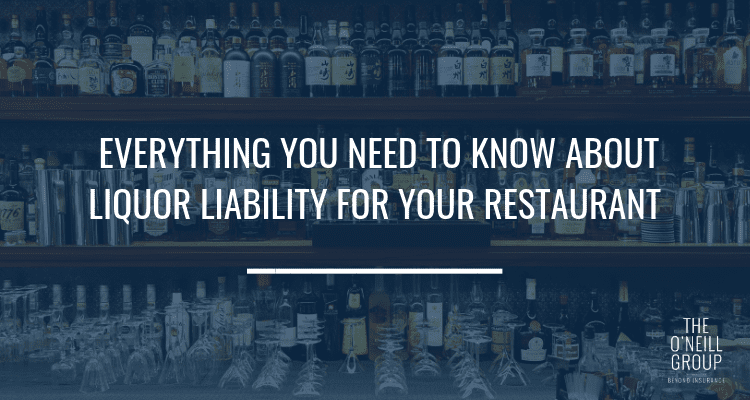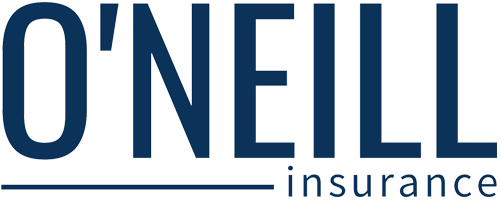
Restaurants that serve alcohol in Ohio expect their customers to be responsible with their alcohol intake. What they don’t expect, is to find out they’re liable for the actions of an intoxicated person.
While most of the time, restaurants that serve alcohol never encounter an incident, the harsh reality is that lawsuits related to liquor liability are filed all too often.
…and all it takes is a single liquor liability claim to put your entire business at risk.
So let’s examine the concept of liquor liability and discuss steps your Ohio restaurant can take to reduce the risks of facing a costly lawsuit or insurance claim.
What is Liquor Liability?
Liquor Liability refers to your restaurant’s legal and financial responsibility for the actions of a person who consumes alcohol at your restaurant and the consequences of those actions.
Under liquor liability laws, your restaurant can be held liable for bodily injuries and property damage that is caused by a person who was served alcohol at your restaurant.
According to the Insurance Information Institute, liquor liability is not limited to those whose primary business is the sale of alcoholic beverages. Your restaurant may have a liquor liability exposure if you do any of the following:
- Sell or distribute alcohol at your restaurant
- Allow customers to bring their own alcohol and consume it at your restaurant
- Serve alcohol at an event you’re hosting
- Allow others to serve alcohol at your venue
The Legal Basis for Liquor Liability
In the US, dram shop laws and negligence laws form the legal basis of liquor liability. What’s more, each state has specific regulations for the sale and distribution of alcohol.
In order to take the appropriate steps to control your risk, it’s important that you understand the laws in Ohio and the local jurisdiction.
For more information, check out the Alcohol & Tobacco Tax and Trade Bureau, which provides links to each state’s alcoholic beverage authority.
Dram Shop Liability Laws
Dram shop liability laws exist in 43 states and allow third parties injured by an intoxicated person to sue a business for contributing to that person’s intoxication.
So, for example – if a customer leaves your restaurant and causes an accident, you could be sued for the damages.
The same applies to injuries that may occur on your property that are caused by intoxication.
Dram shop laws vary from state to state, but typically your restaurant can be held liable if you do any of the following:
- Sell or serve alcohol to minors
- Sell or serve alcohol to customers who are visibly intoxicated
- Sell or serve alcohol to customers who habitually drink
In general, your restaurant must comply with dram shop laws if you do any of the following:
- Sell alcohol in your restaurant
- Host events where alcohol is consumed
- Furnish or serve alcohol via catering
- Allow customers to bring their own alcohol to your restaurant
To learn more about dram shop laws in Ohio, please visit the National Conference of States Legislatures’ website on dram shop civil liability and criminal penalty state statutes.
Negligence Laws
Even in situations where a dram shop law isn’t applicable, your restaurant can still be held liable for alcohol-related incidents.
All 50 states have negligence laws that can hold your restaurant accountable for alcohol-related incidents if your actions don’t align with what a reasonable person would have done in a similar situation.
What Happens if Your Restaurant Serves Too Much Alcohol?
Unfortunately, it’s a question we get more often than not. And in fact, we flip the question to say – what can’t go wrong?
Intoxicated customers can fault you, the restaurant, for a number of incidents that may occur on or off premise as a result of the alcohol.
Incidents can lead to costly judgments against your restaurant, forfeiture of your liquor license or even criminal proceedings:
- Drunk Driving Incidents – Restaurants can be held liable for the damages created by drunk drivers who were inappropriately served
- Fighting – Fights and assaults are among the most common causes of liquor liability claims
- Sexual Assault and Harassment – Your restaurant can be at fault if someone becomes intoxicated there and sexually assaults or harasses another customer
- Trips, Slips, Falls and other Accidents – If incidents occur as a result of alcohol consumption, your restaurant may face a premise liability claim.
- Alcohol Poisoning – The overconsumption of alcohol is all too common. In some cases, overconsumption can lead to alcohol poisoning, which is a common source of liquor liability claims.
Liquor Liability + Risk Management
With all of the risks associated with serving alcohol, some restaurant owners may question if it’s even worth it to serve alcohol.
While some incidents are unavoidable, a proper risk management program can greatly reduce the chances that your restaurant will face a liquor liability claim.
Here’s a few strategies to help reduce your risk of a liquor liability claim:
- Assess Your Risks: Understand the nature of your restaurant and how frequently your restaurant serves alcohol and in what manner.
- Take Steps During the Hiring Process: Inform your prospective employees that your restaurant takes responsible alcohol serving seriously. Let them know that you have specific policies and abide by the state laws related to the service of alcohol. Screen your applicants for any past violations of selling, serving or supplying alcohol to minors.
- Train Your Team: It’s so important to provide ongoing training for your team who serves alcohol. At a minimum, your employee training should address the following:
-
- State and local liquor laws and requirements
- How to verify age and recognize false identification
- The signs of intoxication or alcohol impairment
- Indicators for when someone may be purchasing alcohol for minors
- How to refuse service and manage difficult situations
- The process of documenting incidents
- A consistent method of measuring and serving alcoholic drinks
- When and who to turn to for assistance
- The consequences of not following policy
Document All Alcohol-Related Incidents
If an incident occurs, make sure you complete a liquor liability incident report documenting the measures taken to control the intoxicated person. This report can aid in your defense if an alcohol-related incident occurs.
Third-Party Vendors
Your risk management program should also include recommendations when working with third-party vendors, such as the following:
- Verify that all vendors you work with, such as a caterer or bartender service, are licensed and insured.
- Stipulate in your vendor’s contract that only those who have received an alcohol-awareness training are able to sell or serve alcohol.
- Require the vendor to provide a certificate of liability insurance that includes liquor liability coverage, naming your company as an additional insured.
Create a Written Policy
Once you’ve identified the risk management steps that your restaurant will take, it’s important to document those steps in a written policy. Your written policy will ensure your employees know what is expected at all times and demonstrate to insurance companies that you take liquor liability seriously.
What Is Liquor Liability Insurance?
Unfortunately, even with the best risk management program, you’re still at risk of a liquor liability exposure. To make matters worse, people often file lawsuits against restaurants that do everything in their power to serve alcohol responsibly. When these lawsuits occur, they can be expensive with costs exceeding $10,000 in legal fees. Thankfully, your restaurant can turn to liquor liability insurance.
Liquor liability insurance also helps your restaurant afford the high cost of a liquor liability lawsuit. Policies can be used to pay for expenses such as:
- Lawyers’ fees
- Settlements
- Judgments
- Damages and other court fees
So, if your restaurant is accused of violating a liquor liability law, and that supposed violation causes a loss for someone, a liquor liability insurance policy can cover the cost to make amends.
Liquor liability policies can only protect your restaurant from the costs that develop out of covered alcohol-related incidents that are listed on your policy. Every policy varies, but most liquor liability policies cover the following:
Property damage caused by an intoxicated individual
- Personal injuries caused by an intoxicated individual
- Mental damages
- Employee incidents
What Does Liquor Liability Insurance Cover?
Liquor Liability Insurance covers damaged property and any injuries resulting from selling and serving alcoholic beverages. It also covers any legal costs of defending against damages that were caused by an intoxicated customer.
Does Liquor Liability Insurance Cover Assault and Battery?
When alcohol is involved, fights are a common risk. But many liquor liability policies exclude the coverage for assault and battery.
That is why it’s important to account for this protection when building your policy. It should be noted that assault and battery coverage can also be extended to include specific incidents such as a sexual assault, stabbing or shooting.
Does Liquor Liability Insurance Cover Serving to Minors?
Liquor liability insurance won’t cover any claims that arise from the sale of alcohol to minors or similar illegal transactions. Make sure your servers are verifying if a person is of legal drinking age.
What is the Cost of Liquor Liability Insurance?
The cost varies depending on the type of restaurant and how you serve alcohol. In general, the following four factors determine the rating and pricing of coverage:
- Type of Venue: When examining a business’s risk, underwriters look to identify the primary purpose of a venue. As a restaurant owner, your primary purpose is to serve food, so generally you’re considered as having less risk than a nightclub or tavern.
- Location of Venue: Liquor laws can vary depending on the jurisdiction. Each state has its own scoring system that’s based on the nature of local dram shop laws. Dram shop laws impose certain liability standards on area venues that serve alcohol. Because the strictness of these laws may change from location to location, where you operate your business can have a major impact on how your liquor liability insurance is priced.
- Percentage of Liquor Sales: As a general rule, the more alcohol sales you make the higher your premiums will be. This factor tends to have more of an impact on pricing than venue type, as a restaurant that has a high percentage of alcohol sales may be priced similar to a bar.
- Individual Traits of the Risk: There’s a number of miscellaneous variables underwriters take into consideration when pricing out policies, including the following:
-
- Type of entertainment offered
- Experience level of management
- Formal loss-control measures
- Security measures and procedures for dealing with intoxicated consumers
Bottom Line
If you serve alcohol at your restaurant, you need a proactive risk management program along with a Liquor Liability Insurance policy. However, your liquor liability insurance policy is only one piece of your restaurant risk management and insurance program.
Next Step.
Let’s review your overall restaurant risk management and insurance program. I’m Pat O’Neill a risk advisor at The O’Neill Group, and I’d be happy to help you identify the risk exposures your restaurant faces, and secure for you the right restaurant insurance program. Call me at (330) 334-1561, email me at ptoneill@oneillinsurance.com or click here to schedule a time on my calendar that’s convenient for you to discuss your insurance program.
This article was adapted from Zywave’s Liquor Liability Guide. This is not intended to be exhaustive nor should any discussion or opinions be construed as legal advice. Readers should contact legal counsel or an insurance professional for appropriate advice.


